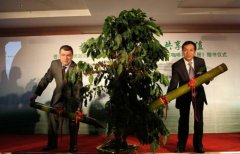Pu'er tea villagers: growing coffee is far more profitable than growing tea.
Behind the booming coffee growing industry, there are international giants such as Nestl é and Starbucks. From planting to initial processing and acquisition, the local area is forming a basic industrial chain. In a number of tea producing areas close to Pu'er City, more and more tea farmers are changing the tea garden to coffee, or at least interplanting coffee in the tea garden.
Compared with tea, the history of coffee growing in Pu'er is much shorter. Due to suitable natural conditions, small seed coffee can be produced in Pu'er, Xishuangbanna, Baoshan and other places in Yunnan. The latter is considered by the coffee industry to be of high quality, with a "rich and long aroma and slightly sour taste", and is now very popular in the international market.
In the early 1990s, Pu'er City began to cultivate the development of coffee as a backbone industry to adjust the industrial structure and increase farmers' income. Yang Weidong, vice mayor of Pu'er City, told SciDev.Net that at present, 54 townships (towns) in Pu'er City, one of the nine counties and one district, have grown coffee. In 2010, the coffee planting area reached 230000 mu, accounting for 50.5% of the country, and the export value was 30.263 million US dollars.
Local farmers told reporters that the income of tea is far less than that of coffee. The total annual income of one mu of tableland tea is less than 2,000 yuan, while one mu of coffee can receive about 150 to 200 kilograms of coffee beans, which can have a net income of 3,000 to 4,000 yuan according to the current market.
Due to the obvious benefits, more and more farmers begin to grow coffee. Dakaihe Village, Nanping Town, Pu'er City, is rich in coffee growth. coffee beans can be seen everywhere in the village, and the surrounding mountains of coffee trees are covered with red fruit. At present, there are 215 coffee growers in the village, with a per capita income of more than 10,000 yuan.
In recent years, Nestl é, Maxwell, Starbucks and other world coffee giants competed to open up raw material bases in Yunnan. Among them, Nestl é and Maxwell purchased 30% of the total coffee in Yunnan in 2009.
Over the years, most of the coffee beans from Dakaihe villagers have been sold to Nestle's Pu'er acquisition station. "at the highest point, you can buy more than 200 tons a day." Li Sunqiang, the person in charge of the Nestle acquisition station, said.
Coffee industry insiders told reporters that neighboring Hainan, Guangdong and other places, due to natural conditions, generally grow seed coffee. The market for this variety of coffee is not smooth. At present, the planting area of coffee in the above two provinces has been greatly reduced, and the output is already quite low.
On the other hand, the natural conditions of Yunnan are suitable for planting high-quality small-grain coffee, and the planting cost is relatively low compared with Brazil and other established coffee producing areas. According to statistics, the production cost of the main international coffee producing countries is 1213.5 yuan / kg. At present, the average cost in Yunnan is less than 10 yuan / kg, and the cost of self-cultivation by farmers is about 8 yuan / kg.
Important Notice :
前街咖啡 FrontStreet Coffee has moved to new addredd:
FrontStreet Coffee Address: 315,Donghua East Road,GuangZhou
Tel:020 38364473
- Prev

Costa Coffee's Coffee Market in China
In China, Starbucks is the first thing that comes to mind when it comes to coffee shops. But Costa, which is also of foreign origin, is expanding aggressively in China to compete with Starbucks in China.
- Next

Steadily promoting the Scientific Development of Pu'er Coffee Industry
The cultivation of coffee in Pu'er City has a history of about 150 years, and it is regarded as the area with the largest coffee planting area, the best coffee planting environment, the best coffee quality, the largest coffee output and the most promising coffee industry in China.
Related
- Can lightly roasted coffee beans be used to extract espresso? How finely should you grind high-quality coffee beans to make Italian latte?
- What is the difference between the world's top rose summer coffee and Yejia Shefi? What are the flavor characteristics of Yega Shefi coffee and Panama rose summer?
- The ceremony is full! Starbucks starts to cut the ribbon at a complimentary coffee station?!
- A whole Michelin meal?! Lucky launches the new "Small Butter Apple Crispy Latte"
- Three tips for adjusting espresso on rainy days! Quickly find the right water temperature, powder, and grinding ratio for espresso!
- How much hot water does it take to brew hanging ear coffee? How does it taste best? Can hot water from the water dispenser be used to make ear drip coffee?
- What grade does Jamaica Blue Mountain No. 1 coffee belong to and how to drink it better? What is the highest grade of Blue Mountain coffee for coffee aristocrats?
- What are the flavor characteristics of the world-famous coffee Blue Mountain No. 1 Golden Mantelin? What are the characteristics of deep-roasted bitter coffee?
- Can I make coffee a second time in an Italian hand-brewed mocha pot? Why can't coffee be brewed several times like tea leaves?
- Hand-brewed coffee flows with a knife and a tornado. How to brew it? What is the proportion of grinding water and water temperature divided into?

